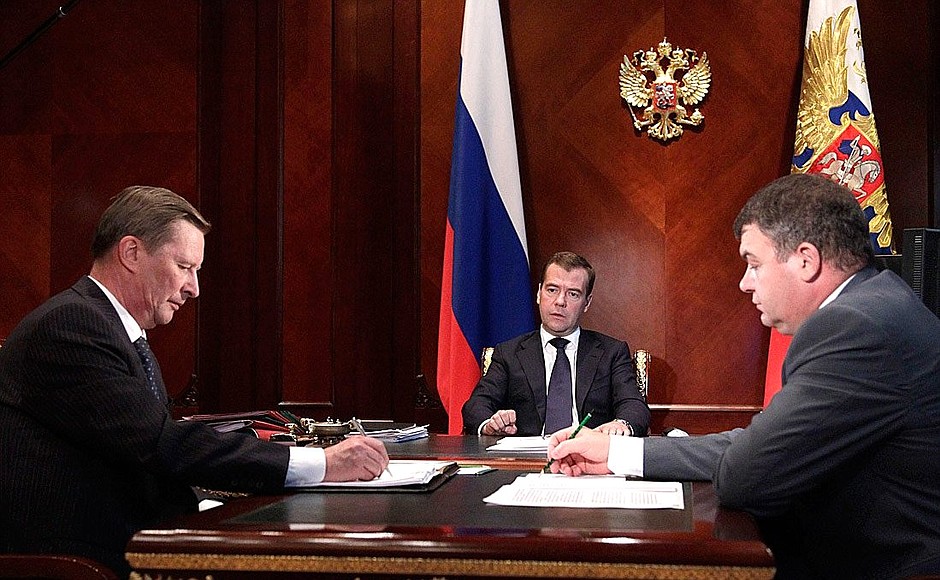
See also
Sergei Ivanov and Anatoly Serdyukov reported to the President on the fulfilment of the state defence order for 2011.
* * *
President of Russia Dmitry Medvedev: Good afternoon, colleagues.
I gave the instruction a few days ago to sort out the situation with the state defence contracts. I asked you to assess how the defence procurement contracts are being carried out, and whether there are any problems. And if there are problems, I asked you to identify who is responsible and make proposals on the action we should take accordingly.
Mr Ivanov, what is your assessment of the situation, and what are your proposals?
Deputy Prime Minister Sergei Ivanov: Mr President,
First of all, I want to say that this year’s defence procurement contracts have two main new features. First, we have now begun carrying out the first part of the state arms programme that you approved last December. The funding for these defence procurement contracts exceeds anything so far in Russia’s modern history. We are talking after all about 750 billion rubles [$26.4 billion] for R&D, buying new equipment, and modernising and upgrading existing equipment. We have never had such funding for defence procurement before.
The second new aspect is that, working together with the Defence Ministry, we are using for the first time a new loan scheme for raising loans backed by state guarantees, which make up part of the overall defence procurement funding. In other words, of the 750 billion rubles total funding, state guarantees backing loans account for 168 billion rubles. The loan scheme in question will be used of course to purchase the very latest and most urgently needed arms, and technology and equipment for use in the missile and space areas, the Air Force, and the Navy. I think that overall, the work on placing orders and concluding contracts with the defence industry companies is going normally, though there are a few delays in some areas, which I will speak about separately.
To date, we still have 230 billion rubles worth of contracts to conclude, of the 750 billion rubles in total. The rest of this money is already accounted for. I have no reason at all today to fear any problems in carrying out the first three-year phase of the state arms programme, which sets out clearly the specific items to be purchased and the funding allocated.
Dmitry Medvedev: I see.
”We are in the process of re-equipping our armed forces. This programme will be implemented over the decade ahead, and we must therefore ensure that the work is as concentrated, well-organised, and rapid as possible.“
Let’s hear then from the Defence Ministry, as the main customer for these goods. What is your view of the situation, and what are your plans?
Defence Minister Anatoly Serdyukov: Mr President, as I reported earlier, we have a total 581.5 billion rubles in funding for the defence procurement programme this year, of which 168 billion rubles are for the loan scheme, which Mr Ivanov just spoke about.
Regarding the main orders, of the total 581 billion rubles, we still have orders worth around 107 billion rubles waiting to be placed. The work is underway, however, and we think that it will be completed within the next 10 days, including with regard to the loans. A number of issues did come up because this is the first time we have used this system, and there were a number of tax-related questions to settle. These issues have all been resolved, and so there are not really any problems now.
The prices the companies wanted were the main reason for the delays encountered. Unfortunately, we could not accept the prices that defence industry companies asked from us. Often these prices were simply not justified. Of course, we have strict demands and want to see each and every figure and the price for each good fully justified with all the necessary calculations attached as proof.
The main companies with which we had differences over prices were the United Shipbuilding Corporation, the United Aircraft Corporation, the Moscow Institute of Thermal Technology, and Russian Helicopters. We have met now with the CEOs of all of these companies and reached agreements. We have no worries now and the contracts will be signed very soon.
But I want to mention one other problem, and that is that, regrettably, the quality the defence industry offers is not always up to our standards. We have stringent standards these days, and we want to receive modern arms and equipment, and we want it to measure up to the quality standards that we set for these goods’ technical characteristics.
We have already spent around 75 percent of the budget and still have 25 percent to be disbursed.
I want to say also that, as you instructed, work is practically complete now on setting up the defence procurement agency Rosoboronpostavka, and this year, 10 percent of the defence procurement orders have already been placed through this agency. Next year, this figure will increase to 50–60 percent, and by 2013, all defence procurement contracts will go through this agency. In other words, your instruction is being carried out in full.
As for the 2012 defence procurement orders, the Defence Ministry’s budget commission has already examined around 30 percent of the 2012 budget, and by September this work will be complete. We will try over the period from September to December to settle and sign the contracts for 2012.
Sergei Ivanov: The Government Military-Industrial Commission is also actively involved in this work.
Anatoly Serdyukov: I think we will succeed in completely transforming the whole preparation, signing and contracting of defence procurement orders in 2012. In other words, already in January there should be no further delays, and from January we can start financing the orders in full.
Sergei Ivanov: Just to clarify the situation, Mr President, the Military-Industrial Commission approves the defence procurement funding in November. In other words, in November this year we will approve the defence procurement orders for 2012. The Defence Ministry will thus be able to start, as from November, concluding contracts for the next year, so that the companies get the money faster.
Anatoly Serdyukov: That is to say, we have no fears that the defence procurement orders will be interrupted or delayed for any reason, and everything will be carried out in full in 2011.
Dmitry Medvedev: I have heard this now from you and from Mr Ivanov. I just want to add a few remarks.
”Defence Ministry must buy only quality goods, and at transparent prices, and not the prices this or that company finds to its liking. If you are offered goods that do not suit you, do not buy them. Place the contracts with other companies.“
First, we must make sure the large sums of money allocated for funding the defence procurement contracts are spent properly. We are in the process of re-equipping our armed forces, and this work needs to keep to the set deadlines. This programme will be implemented over the decade ahead, and we must therefore ensure that the work is as concentrated, well-organised, and rapid as possible. In this respect, I think the Government can do more to get deals settled and contracts concluded quicker. The Defence Ministry must give this its particular attention.
Second, you must buy only quality goods, and at transparent prices, and not the prices this or that company finds to its liking. The economy is different today. We are not living in the Soviet economy, and the Defence Ministry today has to thoroughly examine every single contract, go through all the fine print, examine the cost price of every single piece and item that you are buying. You must understand in full just what exactly goes into them. This is big money, budget money, the people’s money, as we used to say, and so you cannot buy junk. No matter what anyone says, if you are offered goods that do not suit you, do not buy them. Place the contracts with other companies. If all else fails, import the needed goods. Maybe this way they will all start to realise that they need to produce genuinely quality products and not just say that they offer unique models and top-secret technology. These kinds of claims can be used to hide anything and everything. Modern defence technology and modern warfare are completely different to what they were 20–25 years ago, and all the more so 50 years ago.
Third, you must keep watch to ensure that contracts are settled according to the set procedures and rules. If these rules contain anything you think is excessive, we can make the necessary adjustments, or add any needed procedures that are missing at the moment.
We have set up Rosoboronpostavka as a specialised agency with the Defence Ministry. The whole purpose of this decision was to ensure that military goods procurement takes place in a normal environment, with competition where needed, transparency in all cases, and respect for the deadlines. The transfer of responsibility for organising and monitoring implementation of the state defence procurement orders to this agency must therefore be completed within the timeframe that you mentioned. The agency is handling not such large amounts of the orders now, but by 2012–2013 it has to be handle the entire amount, and all procedures will go through this agency, which is under the Defence Ministry’s control.
Finally, and perhaps most important of all, no one has relieved anyone in this chain of their responsibility, from the Government and the Defence Ministry, to the suppliers. If you have any reason to believe that any of the actors in this whole chain are violating their obligations and infringing state discipline with regard to delivering the orders on time, or infringing the procedures for relations, you must report to me personally and I will make the necessary decisions. As I said recently, you can act within the full limit of Government and Defence Ministry powers to ensure that your counteragents and their officials bear full responsibility for the orders placed with them. Are we agreed?
Anatoly Serdyukov: Yes.
Dmitry Medvedev: Thank you.<…>

